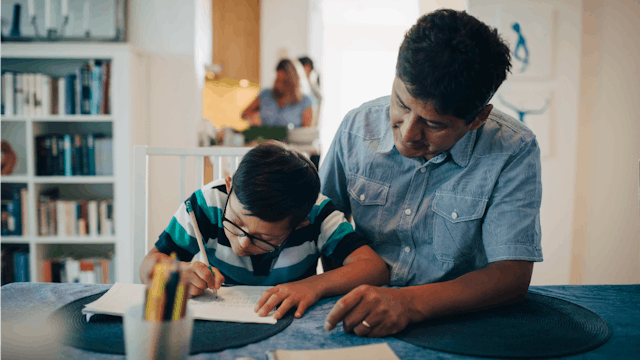No, Not Every Child Has A Special Need

It was a surprisingly warm and sunny afternoon. After a quick snack, I loaded my four kids in the minivan and we went to the park down the street. Other parents had the same idea, and soon I was talking to a mom pushing her daughter in the swing alongside mine. We exchanged the standard pleasantries and discussed our kids’ ages, where they went to school, and their extracurricular activities.
I had to ask my five-year-old not to load fistfuls of playground bark in his shirt…again. I turned back to the mom I was talking to, each of us pushing toddlers in swings, and said, “My kiddo has sensory processing disorder. He just loves the texture of the bark!”
She smiled and shrugged, “Oh, all kids do that.”
She was trying to be nice. But the truth is, they don’t.
All kids don’t do a lot of things my child does.
All kids don’t purposefully fall onto the ground, regardless of the crowd level or place, so the impact can provide their bodies with the input they relentlessly crave. All kids don’t take their forks and rub them up and down their arms instead of using the fork to scoop up food. All kids don’t go into full-on-meltdown mode because a weather alert blasted unexpectedly on the radio and are then unable to sleep for a week straight.
When I share with someone my child’s needs, which extend to three different diagnoses, I’m met with a myriad of responses, including “Boys will be boys” or “That’s boys for you.” Or “Maybe if you would just change his diet, he would stop.” Or “He’s too old to act like that. Have you tried more time outs or a good spanking?” Or “Have you considered using a lavender essential oil blend behind his ears each morning, or maybe a family meditation time?”
The unsolicited advice or lack of support is frustrating, even annoying. Sometimes I want to sarcastically ask, “Where did you get your medical degree, smart ass?” But I don’t. I usually just say something like, “We’ve got it covered” and change the subject. Because I realize that the person I’m speaking with just doesn’t get it, and I don’t have the patience or energy to educate them.
The worst response we get to our child’s special needs is a clapback of sorts. As if special needs is a contest and there must be a declared winner. I’ll have shared something about my child’s needs, and the person responds with, “Every child has some sort of special need. Kids are just weird like that!”
No, no they don’t.
Special needs parenting isn’t a cool bandwagon that everyone needs to jump on. In fact, if you can’t relate to some of the struggles special needs parents have, consider yourself lucky.
Though special needs mamas love our children with every fiber of our being, and we are the epitome of the definition of a Mama Bear, we are tired. We are carting our kids to therapies. We are always up late at night researching the latest information on how we can help our children. We are experimenting with new medications and medical procedures. We’re constantly battling our children’s schools to give our kids what they need in order to have access to the same education the other children receive.
We are often discouraged and we are always worried. Are we mom enough for our kids? Are we looking in the right places for answers? Why isn’t our child progressing?
We are lonely, often isolated from other moms whose biggest worry is if they remembered to get their kid’s favorite Goldfish flavor at the store that morning.
We aren’t anxious over how much play time our child will get in Saturday’s soccer game. We are worried that our children will never get to the point where organized sports is even on our radars.
We are mulling over how we will pay all the medical bills that stack up on our kitchen countertops. We don’t know if the new psychiatrist our child has been assigned is a good fit. We can’t seem to get ahead. But falling behind is not an option. We keep going, and keep pushing forward, because that’s what parents do.
We not only feel lonely in our struggle, but we know that our kids are different and, therefore, are subject to isolation themselves or perhaps are being bullied. We know when our kids are left off the birthday party invite list. We wonder if our kids’ teachers are really seeing our kids for who they are, a person with so much potential and great qualities, and not just as a diagnosis or a disability.
So please, please don’t try to minimize our children’s needs and our realities by claiming that all kids “have something.” It’s dismissive and untrue.
Instead, come alongside us. Ask what our children’s needs are. Ask how you can support us. Ask what things aren’t helpful. Ask for a resource so you can self-educate. Ask how we are doing.
Empathize with your questions rather than render judgment. Because though not all moms are parenting children with special needs, all moms know that the love we have for our children runs deep, and we should honor that with how we treat each other.
This article was originally published on